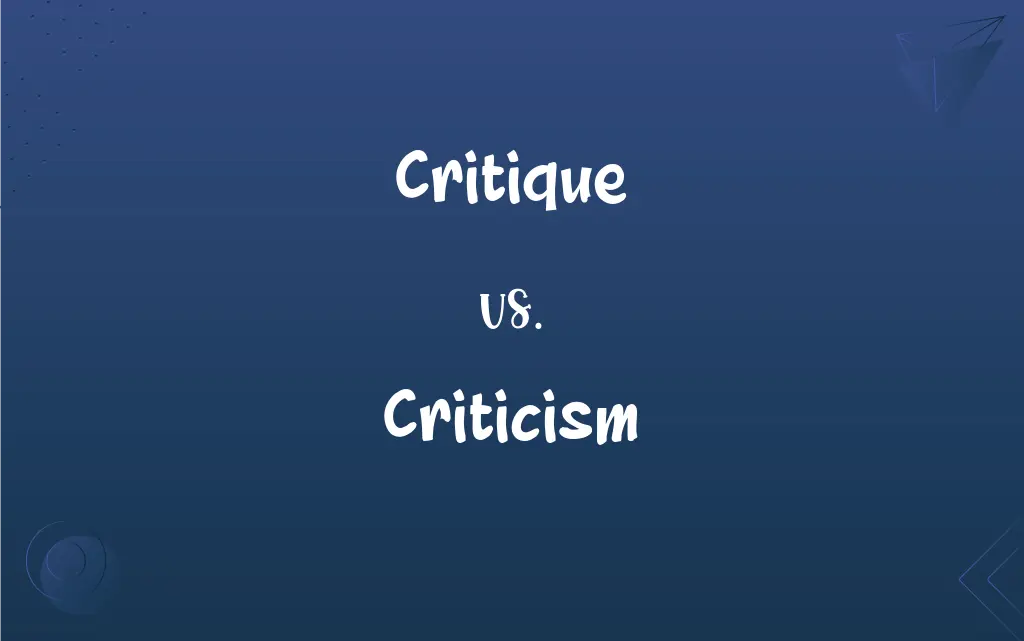Critique vs. Criticism: What's the Difference?
Edited by Janet White || By Harlon Moss || Published on December 9, 2023
Critique is a detailed analysis and assessment, often constructive, of something, while criticism refers to the expression of disapproval of someone or something based on perceived faults or mistakes.

Key Differences
Critique is a thorough evaluation, often with a focus on the positive and negative aspects, aimed at understanding and improvement. Criticism, on the other hand, tends to highlight faults or shortcomings, and can be more negative in tone.
In a critique, the intention is usually to provide constructive feedback that can lead to betterment. In contrast, criticism may not always be intended to be helpful and can be purely evaluative or negative.
Critiques are commonly used in academic, artistic, and professional contexts to analyze and improve work. Criticism, while also common in these areas, can sometimes be more about expressing personal dislike or disapproval.
A critique often involves a detailed and balanced examination, considering multiple facets of the subject. Criticism, however, can be less detailed and more focused on pointing out faults or errors.
The term 'critique' carries a more formal and constructive connotation, suggesting a systematic approach. 'Criticism' can be seen as more general and can be either constructive or destructive, depending on the context and delivery.
ADVERTISEMENT
Comparison Chart
Purpose
To analyze and evaluate with a focus on improvement.
To express disapproval or find faults.
Tone
Often constructive and systematic.
Can be negative or disapproving.
Usage
Common in academic, artistic, and professional evaluations.
Used more broadly in various contexts.
Detail
Typically involves detailed analysis.
Can be less detailed, focusing on negatives.
Intention
Aimed at understanding and betterment.
Can be for expressing personal dislike or disapproval.
ADVERTISEMENT
Critique and Criticism Definitions
Critique
In an academic context, a critique is an evaluation of a theory or literary work.
The professor's critique of the study highlighted its methodological strengths.
Criticism
In literature, criticism refers to the analysis and judgment of the merits and faults of a literary or artistic work.
Literary criticism helps readers understand deeper themes and stylistic nuances.
Critique
A critique is a detailed analysis and assessment of something.
Her critique of the novel provided insightful suggestions for improvement.
Criticism
Criticism is the expression of disapproval of someone or something based on perceived faults or mistakes.
His criticism of her work was harsh and not very constructive.
Critique
Critique can also refer to the practice of judging the merits and faults of something.
His critique of the film was fair, acknowledging both its flaws and achievements.
Criticism
Criticism can be the act of passing judgment as to the merits of anything.
Her criticism of the proposal was that it lacked clear objectives.
Critique
A critique can be an exercise in critical thinking and analysis.
The art student's critique revealed a deep understanding of Renaissance painting techniques.
Criticism
Criticism can sometimes be constructive, offering ways to improve.
Constructive criticism from her mentor helped her improve her writing skills.
Critique
Critique sometimes implies a systematic approach to evaluating a creative work.
Her critique of the musical composition was thorough, covering everything from melody to harmony.
Criticism
Criticism often involves pointing out flaws or errors in something or someone.
The coach's criticism after the game focused on the team's defensive mistakes.
Critique
A critical evaluation or analysis, especially one dealing with works of art or literature.
Criticism
The act of criticizing, especially adversely.
Criticism
A critical comment or judgment.
FAQs
Should a critique be objective?
Ideally, a critique should be objective, focusing on balanced and fair evaluation.
Can critiques be positive?
Yes, critiques can be positive, focusing on strengths while also suggesting improvements.
Can criticism be part of a critique?
Yes, criticism, especially constructive criticism, can be an element of a comprehensive critique.
How can criticism be made constructive?
By focusing on specific areas of improvement and offering suggestions, criticism can be constructive.
Is criticism always negative?
While often perceived as negative, criticism can be constructive and aimed at helping improve.
Is critique important in the academic field?
Yes, critique is vital in academics for the development of ideas and improvement of research.
Can criticism be harmful?
If not delivered thoughtfully, criticism can be harmful and demoralizing.
What is a critique?
A critique is a detailed analysis and evaluation aimed at understanding and improvement.
Are critiques important in the arts?
Yes, critiques are crucial in the arts for evaluating and enhancing artistic expressions.
Should a critique be detailed?
A good critique usually involves a detailed and thorough analysis.
How is criticism different from a critique?
Criticism often involves expressing disapproval or pointing out faults, whereas a critique is more about balanced evaluation.
Is it important to be knowledgeable about a topic to offer a critique?
In-depth knowledge can enhance the quality of a critique, making it more insightful.
How does cultural context affect criticism?
Cultural context can significantly influence the perception and delivery of criticism.
Can criticism be subjective?
Yes, criticism can be subjective, reflecting personal opinions and biases.
Is it necessary to have expertise to offer criticism?
While expertise can inform more insightful criticism, anyone can offer criticism based on their perceptions.
Are there different types of critiques?
Yes, there are various types of critiques, each with a focus on different aspects of evaluation.
Can criticism lead to positive change?
Constructive criticism can definitely lead to positive change and improvement.
Is critique only applicable to creative works?
No, critique can be applied to a wide range of subjects, including theories, policies, and performances.
How can one handle criticism effectively?
By staying open-minded and focusing on the constructive aspects, one can handle criticism effectively.
Can critiques be revised or updated?
Yes, critiques can be revised as new information becomes available or perspectives change.
About Author
Written by
Harlon MossHarlon is a seasoned quality moderator and accomplished content writer for Difference Wiki. An alumnus of the prestigious University of California, he earned his degree in Computer Science. Leveraging his academic background, Harlon brings a meticulous and informed perspective to his work, ensuring content accuracy and excellence.
Edited by
Janet WhiteJanet White has been an esteemed writer and blogger for Difference Wiki. Holding a Master's degree in Science and Medical Journalism from the prestigious Boston University, she has consistently demonstrated her expertise and passion for her field. When she's not immersed in her work, Janet relishes her time exercising, delving into a good book, and cherishing moments with friends and family.































































